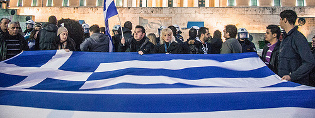Greece (MNN) — Greece ground to a standstill for two days this week as millions of Greeks walked off their jobs to protest the toughest measures yet unveiled by the government.
Schools are closed, hospitals are operating with only emergency staff, and road, rail, and air services are suspended.
Government leaders are desperately trying to find ways to slash the nation's deficit and jump-start the stalled economy. Tasos Ioannidis with AMG International says, "Additional taxes that have been passed in Greece have resulted in less and less, in terms of the benefit to the public treasury. So, yes, they have squeezed everything that can be squeezed from the people."
The strike heralds a crucial parliamentary vote on $17 billion in added austerity measures. Athens must approve it in order to release another bailout for the European Union and the International Monetary Fund. Although unpopular, notes Ioannidis, "When these measures pass, a huge $31.5 billion dollar installment will be given to Greece. A lot of that is going to recapitalize the banks and also to help the government pay off its debts to private companies."
Without help, Greek coffers will be empty on November 16. So right now, Ioannidis says people are afraid, but the alternative is devastating. "Salaries are being cut and pensions are being cut, so there are a lot of people who are hurting. That's what they are doing to protest those cuts. Over time, those protests will fade away just because the alternative would be complete bankruptcy–which would be even worse."
Parliament is looking at further pay cuts, tax hikes, and an increase in the average retirement age by two years: from 65 to 67. With unemployment already at 25%, this new plans means thousands more public employees will lose their jobs, and severance payments will be slashed.
These conditions have placed a strain on AMG's team in Greece who are doing all they can to minister to those who are hurting and suffering, says Ioannidis. "We are raising what we are able to raise to provide for those who are hurting, providing help-working with churches to provide meals, to provide basic things for their daily living." Churches are playing a big role in this as community centers where people can seek solace and get help.
AMG's ministries in Greece also include St. Luke's Hospital — a state-of-the-art medical facility, which has also seen an uptick in services. "We are seeing a lot of people who are coming to us because even basic medical care is harder to get. We are doing all that we can to provide the care as affordably as possible."
There are also AMG Christian bookstores, childcare ministries, newspaper evangelism, literature and periodical publishing and distribution, and a prison ministry. Despite the bitter taste of the measures being taken, "The one good thing about this economic downturn is that it has made people more responsive to the message of the Gospel as they become more desperate and more hopeless, and are looking for somebody to give them hope." Ioannidis adds: desperate people find solace in that idea because "that somebody is Christ, and they are becoming more responsive to that message."
As hard as things are in Greece, Ioannidis thinks the economic free-fall may be slowing. That could signal a turnaround, but there's a lot of work yet to do. In the meantime, "Pray that there would be wisdom that the right steps are taken, and pray for the people who respond to the message of the Gospel. Pray also that the necessary material resources are provided, and that ministries receive support they will be able to use to feed people, to care for people."

